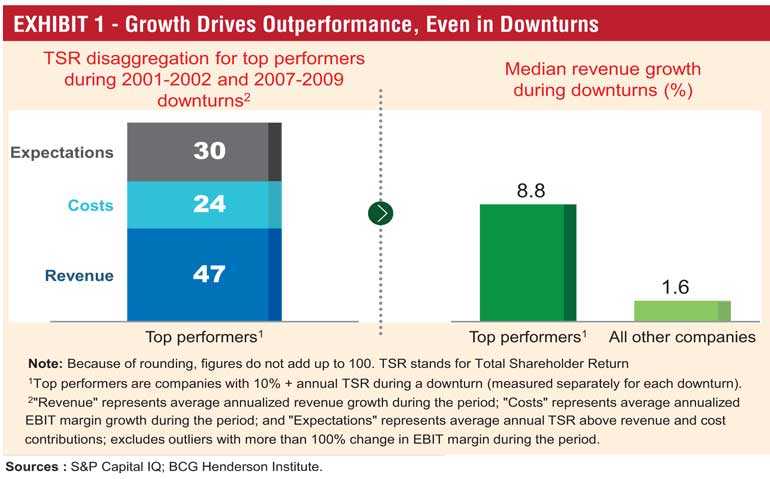Wednesday Feb 25, 2026
Wednesday Feb 25, 2026
Tuesday, 1 December 2020 00:00 - - {{hitsCtrl.values.hits}}

COVID-19 is causing massive disruption in the business landscape globally. Learning from and adapting to the new normal is what will differentiate businesses going forward.
Many companies in Sri Lanka have launched rapid response measures to address the volatile situation today; examples include reducing costs, creating digital solutions, establishing remote working policies, stabilising supply chains and using technology to connect actively with stakeholders.
However, to emerge as winners in the new normal, companies need to make more fundamental and radical changes. Transformation needs to be the top priority of every CEO in Sri Lanka. Yet, with all that is happening around us, executing a transformation has never been tougher!
BCG’s experience with more than 750 successful transformations has helped us understand what will enable CEOs in Sri Lanka to lead successful transformations. These proven measures should head the agenda of any CEO thinking about rebounding from the crisis and building resilience.
1. Launch a transformation program
Our research shows that 57% of companies launch a comprehensive transformation program within one year of experiencing a severe reduction in total shareholder return. Such decisive actions have led to increased chances of success in both the short and the long term.
Formal transformation programs that involve defining a holistic strategy with clear transformation goals and effective monitoring of progress towards those defined goals boost investors’ confidence, leading to an increased valuation relative to earnings. A well-managed program delivers quickly, ensures discipline, includes actions to build up needed capabilities, and establishes effective communication both within and outside the organisation.
2. Communicate a compelling transformation story
Transformational change is hard. Getting an organisation to change requires winning the hearts and minds of all stakeholders. The people inside the organisation must understand the rationale for change and feel inspired to embark on the transformational journey. All this must be done while, at the same time, developing a sense of urgency.
3. Unlock immediate gains to fund the change
Take immediate steps to begin delivering results. Send cash to the bottom line and fund future initiatives. It is imperative to first roll out initiatives with short term impact.
Using digital to improve pricing or optimise promotions can increase revenue by 4–6%, while also improving EBIT margins by up to two percentage points. Use of analytics to identify the best channel mix and marketing messages can produce substantial gains in sales. Companies that digitise their sales functions can generate 10–20% higher revenue while reducing the cost per lead by 15–30%.
Robotic process automation, machine learning and AI can handle administrative and repetitive tasks, and reduce head counts by 20–30% in corporate centres. Rapid early measures can help build critical expertise and increase credibility both internally (workforce and board) and externally (investors and other stakeholders).
4. Be bold and focus on growth
CEOs need to have bold ambition and must aspire to seek the full potential of transformation rather than embrace incremental change. BCG research shows that over the long term, revenue growth has a greater impact on transformation success, contributing, on average, nearly half of the cumulative value creation after five years (see Exhibit 1) instead of just cost reduction.
Transforming for growth may involve higher investment. Our findings suggest that such investments can increase the likelihood of success by up to 29 percentage points. Expanding capacity through capex investment demonstrates intent to exploit existing opportunities. Investments in R&D and digital capabilities can help companies in Sri Lanka redesign their business models, tap into new markets, and engage better with end users.
5. Lead from the front and rally middle management
Whilst a committed and visibly engaged senior leadership team is very important for a successful transformation, the middle management is also critical in seeing the process through to completion. Failure to get the middle management on board will often result in them resisting change. They will tend to defend their functional silos and power bases. Some companies choose to involve the middle management right from the planning phase through to execution, thereby on-boarding them towards a common goal.
6. Marshall the best talent
Any transformation is only as effective as the people who execute it. Successful companies demonstrate visible commitment to the organisation by appointing the best people with the highest potential to lead the transformation. They must over-invest in building capabilities: assess skills required within the organisation; source externally where needed; and actively manage the talent by rewarding and retaining strong performers and rotating out the under-performers.
7. Encourage a ‘fail fast, learn fast’ culture
Building an agile mindset is pertinent in such a transient environment. It involves perseverance, addressing roadblocks quickly, adapting to the changing context and driving cross-functional, ‘fail fast learn fast’ behaviour across the organisation.
COVID-19 has left the world in crisis. But CEOs can use this adversity to their advantage by adopting the playbook of transformation. This will entail launching a bold transformation program, sharing a compelling story, unlocking quick wins, focusing on growth, leading from the front, marshalling the best talent and encouraging a ‘fail fast learn fast’ culture. CEOs can then tilt the odds in their favor and position their organisations to win over the long term.
(Chilman Jain is Principal, Boston Consulting Group and Prateek Roongta is Managing Director and Partner, Boston Consulting Group. Views are personal.)
(Boston Consulting Group is a premier global management consulting firm founded in 1963. BCG partners with leaders in business and society to tackle their most important challenges and capture their greatest opportunities.)